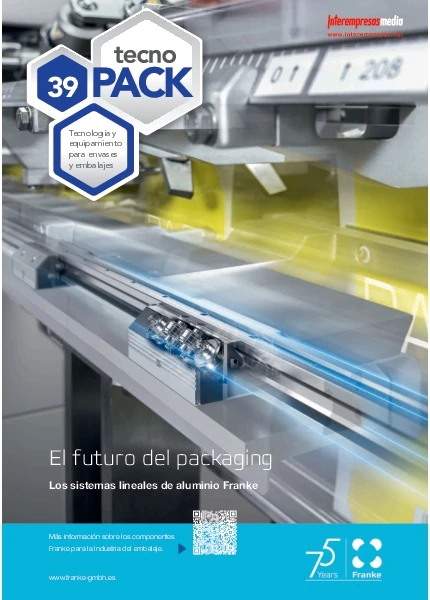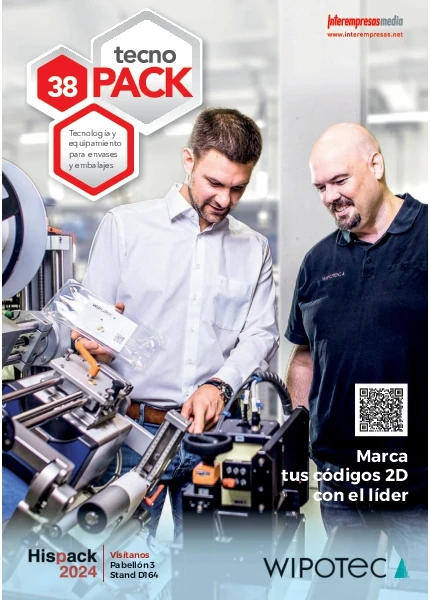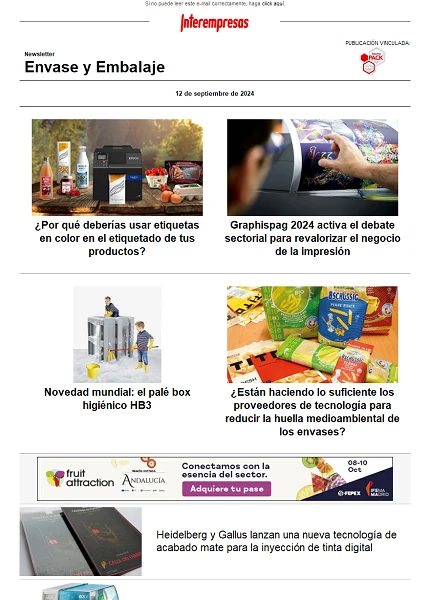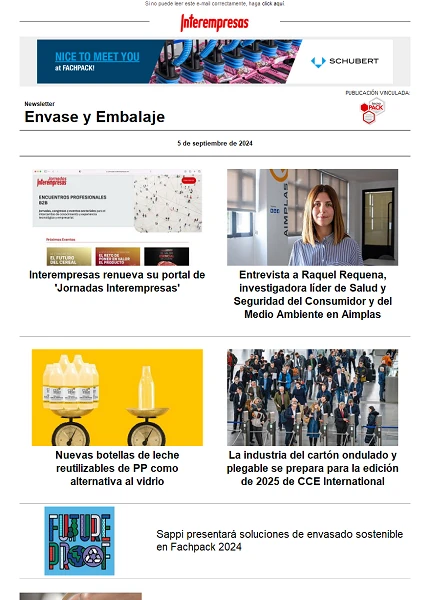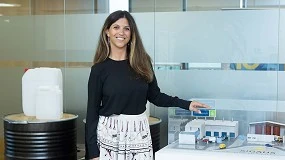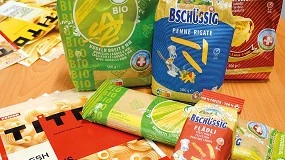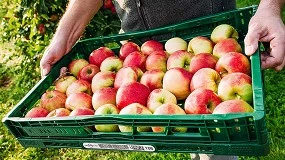Envases sostenibles: verdes e indestructibles
24 de diciembre de 2010
Entre otras cosas, de aquí a 2020 deben integrarse en la cadena de suministro de Unilever medio millón de pequeños granjeros y comerciantes. “Queremos ser una empresa sostenible en todo el sentido de la palabra”, afirma el director de Unilever, Paul Polman. Sin embargo, para este director, lo más importante no es la conservación de la naturaleza, sino el resultado económico. Para muchos consumidores, la actuación sostenible se ha convertido en un criterio de compra importante. Anteriormente apenas se preguntaba por el origen, el tipo de producción y el envase, pero actualmente se valoran más las mercancías ecológica y moralmente “limpias”. Por lo tanto, la empresa de investigación de mercado de los Estados Unidos, Pike Research, cree que las ventas mundiales de envases sostenibles en el periodo de 2009 a 2014 aumentarán de 88 a 170.000 millones de euros de dólares, casi el doble. “La conciencia medioambiental de los consumidores ha aumentado claramente debido al debate actual sobre el clima”, explica Clint Wheelock, director de Pike Research.
Los estilos de vida se hacen “más verdes”
Junto a la protección del clima, los aspectos sociales tienen un papel cada vez mayor. Los consumidores modernos desean tener una vida más sana y por ello valoran mucho los alimentos naturales, que estén empaquetados de forma totalmente segura y que tengan un sabor genuino. Esta clientela es también cada vez más importante, de modo que los fabricantes de productos realizan un compromiso social y ofrecen mercancías correctamente tratadas. “Observamos una tendencia al consumo ético”, explica el analista Jens Lönneker, de la empresa de investigación de mercado de Colonia Rheingold. Según explica, el comercio justo se encuentra establecido desde hace tiempo entre los denominados Lohas (Lifestyle of Health and Sustainability), es decir, el grupo de consumidores que orienta su estilo de vida por la salud y la sostenibilidad. La tendencia va en aumento actualmente entre los mayores de 18 años que en lugar de refrescos y cervezas convencionales prefieren cervezas o refrescos de comercio justo en botellas de diseño.
Para la industria, la tendencia a la sostenibilidad es una bendición y una maldición al mismo tiempo. Por una parte debe desarrollar nuevos productos y campañas que le suponen grandes costes. Por otra parte, la demanda creciente de productos sostenibles es una promesa de crecimiento económico. Por este motivo, los grandes consorcios, potentes financieramente, como Coca Cola, Kraft Foods o Unilever siguen estrategias de sostenibilidad de amplio alcance. Prestan apoyo a organizaciones medioambientales, de defensa de la naturaleza y asistenciales, o bien realizan ayudas directas para el desarrollo por ellos mismos. Asimismo, invierten en instalaciones de producción y envasado más eficientes. “Hasta 2020 reduciremos nuestro consumo de material en un tercio”, promete el director de Unilever.
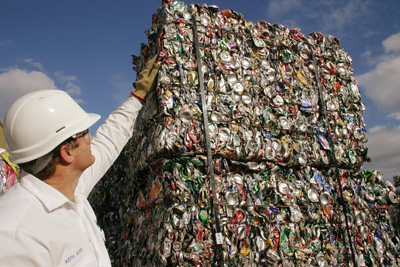
Material sostenible: las latas de aluminio no tienen precisamente fama de ecológicas, pero su índice de reciclaje es del 96%. Fuente: Alcoa.
Los fabricantes de envases ayudan a la industria a reducir su impacto ecológico. Diseñan nuevos envases y desarrollan los procesos de producción para ello. No es una tarea fácil: por medio de grosores de material menores y proporciones inferiores de materiales que consumen muchos recursos, se ahorran materias primas, sin que por ello deban resentirse la hermeticidad ni la resistencia del envase.
“Lo más importante es la protección del producto”, comenta Stefan Glimm, director gerente de la Asociación Alemana de la Industria del Aluminio (GDA). No en vano, la seguridad es lo principal: según la Organización Europea de Envases y Medio Ambiente (Europen), el valor de los recursos integrados en los productos alimenticios es mucho mayor que el valor del envase que protege el producto. Por ello, las pérdidas de producto debidas a un envase insuficiente causan más emisiones de CO2 de las que se ahorran evitando un envase innecesario.
En los países en vías de desarrollo, las pérdidas de alimentos son un gran problema: según los datos de Europen, el 40% de las mercancías se pierde en la cadena de suministro. De este modo, una mejor protección de los productos en estos países podría ser una descarga considerable para el medio ambiente. También en la edición de Interpack que se celebrará del 12 al 18 de mayo de 2011, el evento más importante a nivel mundial del sector de los envases, la protección alimentaria será uno de los temas principales.
La exposición especial ‘Save Food’, diseñada junto con la Organización Mundial para la Agricultura y la Alimentación de la Naciones Unidas (FAO), muestra cómo los diferentes elementos de la cadena de creación de valor en materia de envasado, la logística y el transporte pueden realizar una contribución contra el despilfarro mundial de alimentos.
La seguridad es lo más importante
Los fabricantes de envases demuestran con múltiples innovaciones que la seguridad y la ecología no deben ser opuestas. Por ejemplo, la empresa de los EE.UU Sonoco presentará en Interpack 2011 soluciones de envases eficientes de su nueva “True Blue Line”. Según Jeff Schuetz, portavoz de la empresa, con una resistencia uniformemente alta, éstos necesitan menos material o pueden reciclarse más fácilmente que los envases existentes hasta ahora.
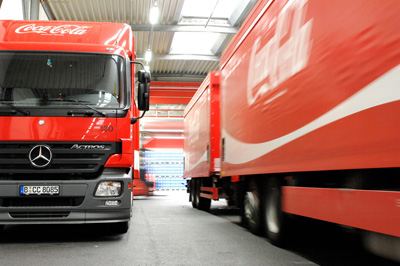
Transporte optimizado: Coca-Cola reduce sus emisiones de CO2 con trayectos de distribución más cortos. Fuente: Coca-Cola.
La industria ya se sirve de esta gama regularmente. El fabricante alemán de productos alimenticios Kraft Foods utiliza para sus marcas de café Maxwell House, Nabob y Yuban, en vez de latas metálicas, nuevos envases de cartón reciclable diseñados por Sonoco. Unilever ha rediseñado las botellas de plástico para sus productos de cuidado del cabello de la marca Suave con la ayuda de Sonoco: los nuevos envases necesitan un 16% menos de material, pero gracias a su novedosa forma abombada, son más resistentes que sus predecesores.
La Asociación de la Industria Alemana de Envases de Plástico (IK) lo ha confirmado en base a este tipo de innovaciones: el plástico es ideal para fabricar envases sostenibles. “Es muy versátil”, explica Isabell Schmidt, responsable de IK para el medio ambiente y el desarrollo sostenible. El plástico ofrece protección, es transparente y gracias al peso reducido de los envases puede ahorrarse costes de transporte y evitarse emisiones de CO2. Y el sector desea aumentar todavía más su contribución a la sostenibilidad. “El objetivo es, entre otros, producir envases todavía más ligeros y seguir aumentando el grado de reciclaje”, afirma la Schmidt.
Además del plástico, que es el material utilizado más frecuentemente para los envases en todo el mundo, también los materiales para envases más corrientes como papel/cartón, vidrio y metal/aluminio ofrecen oportunidades para mantener una estrategia de envases sostenibles, ya que cada uno tiene sus propias ventajas. Por ejemplo, el papel, cartón liso y corrugado, según un estudio del Instituto Holandés de Investigación CE Delft, causan una emisión de CO2 inferior que la mayoría de los demás tipos de envases, lo que se obtiene, entre otras cosas, con una producción más eficiente y unas emisiones inferiores debido al transporte.
El equivalente de CO2 del papel y materiales afines es de 676 kilogramos de CO2 por tonelada de material. En cuanto a los otros materiales para envases convencionales hay un mínimo de 1.000 kilos de CO2. El vidrio, por su parte, no puede valorarse por su peso bajo, pero es reutilizable, reciclable y absolutamente seguro. “El vidrio es inerte y prácticamente no existen interacciones entre el contenido y el envase”, explica Johann Overath, director ejecutivo de la Asociación Alemana de la Industria del Vidrio. Además, se fabrica casi exclusivamente con materias primas presentes en la naturaleza en abundancia.
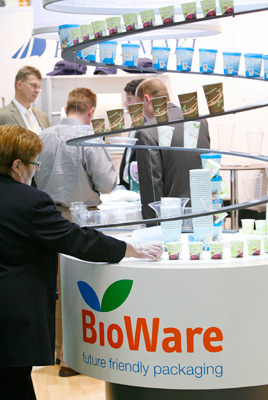
La ecología es un triunfo: a menudo, los envases de bioplásticos están fabricados con materias primas renovables – por ello encajan en la estrategia de sostenibilidad de muchas empresas. Fuente: Messe Düsseldorf.
Es muy valorado por los consumidores que aprecian el sabor puro y desean consumir productos con envases “sanos”. Según una encuesta de la Asociación Europea de Envases de Vidrio, el 75% de los europeos encuestados preferían los envases de vidrio, ya que contribuyen a un estilo de vida sano. También la hojalata y el aluminio protegen los alimentos y pueden reciclarse fácilmente. En el aluminio, el reciclaje alcanza el 82,3%, en las latas de bebidas de este metal llega al 96%. “Este porcentaje debe aumentarse cerrando los circuitos”, afirma el director gerente de GDA. Además, el sector desea ahorrar material. “El objetivo es proteger más productos con menos aluminio”, añade.
Los bioplásticos ganan protagonismo
Sin embargo, los fabricantes de materiales para envases establecidos deben contar con la competencia creciente de los bioplásticos. Es verdad que no pueden usarse tan versátilmente como los plásticos convencionales con base de petróleo crudo, pero cada vez se perfeccionan más sus características. La empresa británica Innovia Films ofrece como novedad, bajo el nombre de Natureflex, una lámina plástica degradable para envasar alimentos, compostable en un 100%. Esta biolámina multicapa, según Andy Sweetman, director de marketing, proporciona un excelente efecto barrera contra la humedad y los gases, que mantiene crujientes de forma duradera alimentos como las galletas.
El fabricante alemán de bioplásticos FKuR Kunststoff apuesta por el perfeccionado efecto barrera: la empresa produce, entre otras cosas, bioláminas multicapa, que proporcionan también seguridad contra escapes en los pañales ecológicos para niños. Los bioenvases especialmente adecuados para bajas temperaturas, un nuevo desarrollo de FKuR, se utilizan para envasar alimentos congelados.
La evolución espectacular de los bioplásticos tiene su reflejo también en Interpack. En 2005 hubo una exposición especial de 250 metros cuadrados de superficie neta, ocupada por fabricantes de bioplásticos, mientras que en 2011 serán unos 2.000 de la superficie de exposición regular.
Sostenibilidad ya en la producción
También los fabricantes de máquinas de envasar pueden contribuir a hacer que los costes de los envases desciendan rápidamente. La Asociación Técnica de Máquinas para Procesamiento de Alimentos y Máquinas de Envasar, de la Asociación Alemana de Construcción de Máquinas e Instalaciones (VDMA), no sólo ve potenciales de ahorro en los materiales para envasar. También existe una contribución fundamental a una producción sostenible en la reducción del consumo de energía y medios de producción de las máquinas de envasar a través de la técnica moderna.
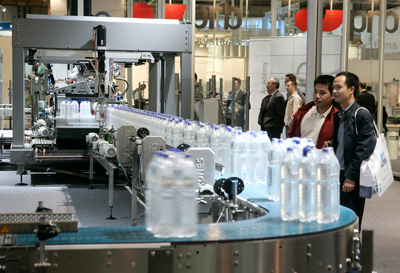
Producción eficiente: las modernas líneas de envasado consumen menos energía y reducen costes. Fuente: Messe Düsseldorf.
Así, por ejemplo, podría utilizarse la servotécnica descentralizada, que trabaja de forma más dinámica y eficiente que los grandes impulsores. Es cierto que los costes de adquisición de estas máquinas son altos, pero según VDMA, estos gastos se amortizan rápidamente en el curso del ciclo de vida de una moderna instalación gracias al consumo de energía inferior. Los fabricantes de productos que apuestan por la sostenibilidad no se benefician sólo en el lugar de venta, sino ya en la producción.


